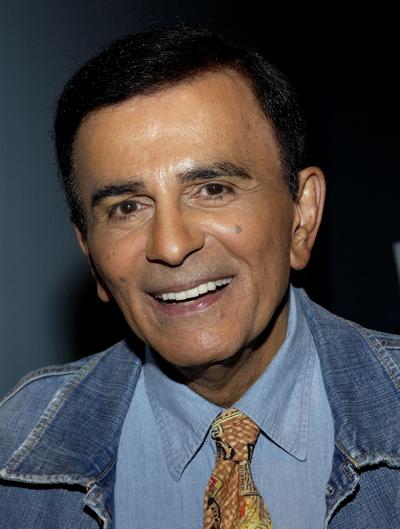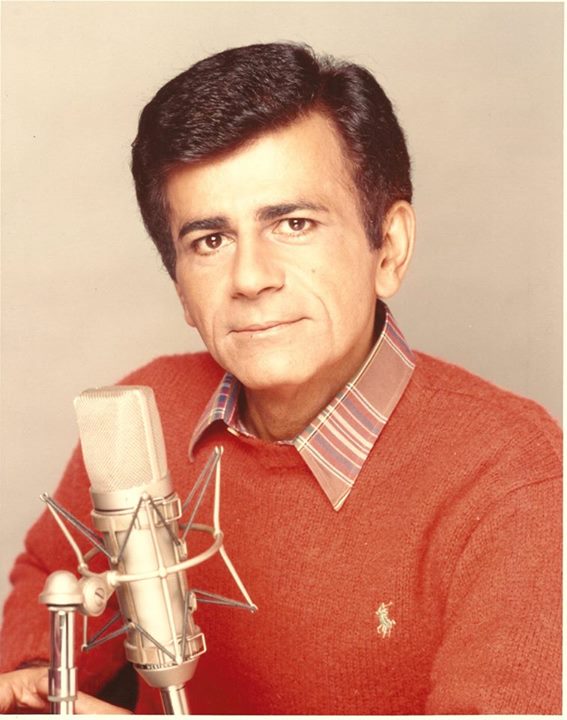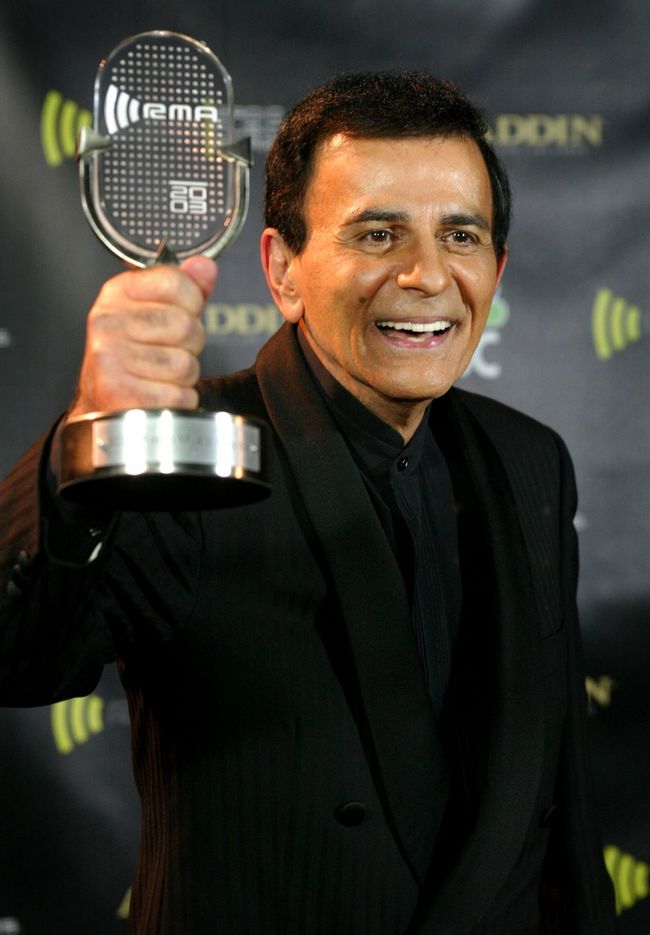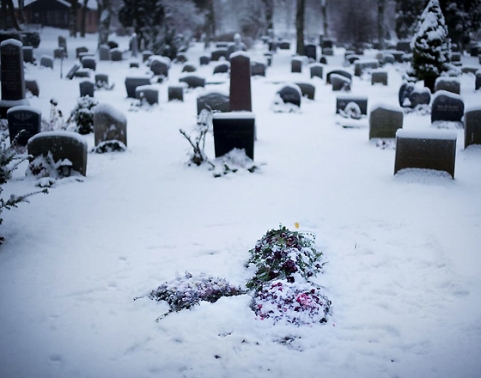Casey Kasem (Kemal Amen Kasem)

Casey Kasem
Kasem was born Kemal Amin Kasem in Detroit, Michigan, on April 27, 1932, to Lebanese Druze immigrant parents. They settled in Michigan, where they worked as grocers. Kasem was a graduate of Northwestern High School in Detroit and Wayne State University.
Kasem, whose professional radio career started in the mid-1950s in Flint, Michigan, was drafted into the U.S. Army in 1952 and sent to Korea, where he was a DJ / announcer on the Armed Forces Radio Korea Network. He developed his rock-trivia persona from his work as a disc jockey in the early 1960s at KYA in San Francisco, California, and KEWB in Oakland, California. He also worked for several other stations across the country, including WJW (now WKNR) in Cleveland, Ohio; WBNY (now WWWS) in Buffalo, New York; and KRLA 1110 in Los Angeles, California (1963–69), before launching the national show American Top 40 on July 4, 1970. Kasem also featured in several low-budget movies in the 1960s. In 1967 he played the role of “Mouth” in the motorcycle gang film precursor to Easy Rider, The Glory Stompers which also starred Dennis Hopper and two scions of Hollywood royalty Jody McCrea (son of Joel McCrea) and Lindsay Crosby (son of Bing Crosby), along with Chris Noel and Jock Mahoney. In 1969 he played the role of “Knife” in the “surfers vs. bikers” film Wild Wheels, plus he had a small role in another biker movie, The Cycle Savages, starring Bruce Dern and Melody Patterson, best known for her role as “Wrangler Jane” in the fondly remembered comedy series F-Troop.
Kasem was best known as a music historian and disc jockey, most notably as host of the weekly American Top 40 radio program from July 4, 1970 through 1988, and again from March 1998 until January 10, 2004, when Ryan Seacrest succeeded him. During Kasem’s original run (1970–88), his show featured certain songs in addition to the countdown, such as a “long distance dedication” from one listener to another; or, the song of a “spotlight artist.” On the July 4 weekend of each year, the show’s anniversary, Kasem often featured a special countdown of particular songs from a certain era, genre or artist. The Moody Blues were the only artist to appear in both Kasem’s first countdown on July 4, 1970, and his last on August 6, 1988. Michael Jackson appeared in both countdowns, but as part of The Jackson Five in 1970 and as a solo artist in 1988. Kasem hosted the spin-off television series America’s Top 10 for most of the 1980s. For a period in the late 1970s and early 1980s, Kasem was the staff announcer for the NBC television network. He later appeared in infomercials, marketing CD music compilations. Kasem received a star on the Hollywood Walk of Fame on April 27, 1981 (his 49th birthday) and was inducted into the National Radio Hall of Fame in 1992. When he was hosting American Top 40, Kasem would often include trivia facts about songs he played and artists whose work he showcased. Frequently, he would mention a trivia fact about an unnamed singer before a commercial break, then provide the name of the singer after returning from the break. This technique, called a tease, later also made its way into America’s Top 10, where viewers would submit trivia questions for him to answer. In 1971, he provided the character voice of Peter Cottontail in the Rankin/Bass production of Here Comes Peter Cottontail opposite Vincent Price providing the voice of the villainous Iron Tail. Kasem would end both his radio and television broadcasts with his signature sign-off, “Keep your feet on the ground and keep reaching for the stars.”
In 1972, Kasem appeared in the low-budget film The Incredible 2-Headed Transplant, which also starred Bruce Dern. In 1984, Kasem made a cameo in Ghostbusters, reprising his role as the host of American Top 40.
From January 1989 to March 1998, when Kasem was not at the helm of AT40, he was host of Casey’s Top 40, Casey’s Hot 20, and Casey’s Countdown, syndicated by the Westwood One Radio Networks. He was also the host of the short-lived American version of 100% during the 1998–9 season, and would close each episode by inviting viewers to join him that weekend on AT40, to which Kasem had just returned.
In August 2006, XM Satellite Radio, now merged with Sirius Satellite Radio, began airing newly restored versions of the original American Top 40 radio show from the 1970s and 1980s. Premiere Radio Networks also started airing reruns of AT40, dating from 1970 to 1988, in January 2007.
On January 3, 2004, Kasem gave up hosting duties of American Top 40, with Ryan Seacrest becoming the new host. Kasem signed a new contract that continued his two American Top 20 shows. That March theadult contemporary version became American Top 10. At the end of the year, Kasem recorded several holiday-themed programs to air on stations that flip to “all-Christmas” for the holidays. In April 2005, the television special American Top 40 Live aired on the Fox network, hosted by Seacrest, with Kasem appearing on the show.
In November 2007, Kasem’s son Mike became his regular and final substitute host for American Top 20 and American Top 10. In June 2009, Premiere Radio Networks announced it would cease production of the two shows after the Fourth of July holiday, ending Kasem’s 39-year run in the radio countdown business. He briefly appeared on his daughter Kerri’s podcast in late 2009. As of 2014, reruns of 1970s and 1980s shows play on a number of U.S. stations.
Kasem began his television career hosting Shebang, a dance show aired weekday afternoons on Los Angeles television station KTLA in the mid to late 1960s. His first work as a voice actor was as the voice Robin in the 1968Batman cartoons. Kasem went on to become a prominent voice actor, and is most connected in that field to his work for programs produced by Hanna-Barbera. His best known role was the voice of Shaggy in the Scooby-Doofranchise, beginning with the first series, Scooby-Doo, Where Are You! (1969), and continuing until 1995, and again from 2002 to 2009. He has done work for many other animated series, including reprising his role as Robin for various versions of SuperFriends (1973-85), three 1970 episodes of Sesame Street, the drummer Groove from The Cattanooga Cats (1969), Alexander Cabot III from Josie and the Pussycats (1970) and Josie and the Pussycats in Outer Space (1972), Merry from The Return of the King (1980); and television specials, such as Rankin-Bass’ Here Comes Peter Cottontail (1971).
He voiced Mark, the American name of Ken Washio in Battle of the Planets, the first American version of Gatchaman, as well as Bluestreak, Cliffjumper, Teletraan I and Dr. Arkeville in the original Transformers animated series, but left during the third season due to what he perceived as offensive caricatures of Arabs and Arab countries in one episode. In a 1990 article he wrote:
A few years ago, I was doing one of the voices in the TV cartoon series, Transformers. One week, the script featured an evil character named Abdul, King of Carbombya. He was like all the other cartoon Arabs. I asked the director, “Are there any good Arabs in this script for balance?” We looked. There was one other — but he was no different than Abdul. So, I told the show’s director that, in good conscience, I couldn’t be a part of that show. I wrote a letter to the President and Chief Executive Officer of Marvel Productions, Margaret Ann Loesch. Here is her reply, in part: “Dear Casey: I received your letter regarding the negative stereotyping that has been occurring on television in the portrayal of Arabs and Arab-Americans. I share your concerns. Your letter has been distributed to our writing staff and our voice directors in the hopes that they can be more sensitive to this issue and therefore more responsive to the problem.”
Kasem performed many TV commercial voice overs for companies and products like A&P, Chevron, Ford, Red Lobster, Raid, Oscar Mayer, Hoover vacuum cleaners, Velveeta, Joy dishwashing liquid, Heinz ketchup, Sears,Prestone, Dairy Queen, Continental Airlines, the California Raisin Advisory Board, the National Cancer Institute, and promos for the NBC television network . In March 2010, Kasem appeared in a commercial for Sprint 4G, reprising his role as AT40 host.
From 1980 to 1989 and again from 1991 to 1992, Kasem also hosted the syndicated American Top 40 TV spin-off America’s Top 10, a weekly half-hour music video show that counted down the top 10 songs in the United States. He initially was hired as the narrator for the TV show Soap, but quit the series after the pilot due to the controversial adult themes the show promoted. Rod Roddy replaced him as narrator; it was Roddy’s first national television announcing job.
In addition to voice acting, Kasem appeared on camera on at least two episodes of Hawaii Five-O and Nick at Nite on New Year’s Eve from 1989 to 1998, counting down the top reruns of the year. He also made two cameo appearances on the TV show Saved by the Bell in the early 1990s and one cameo appearance on Quincy, M.E. in the episode “An Unfriendly Radiance.” As well, Kasem appeared in an episode of ALF during that show’s 4th season.
In the late 1970s, Kasem portrayed an actor who imitated Columbo and had a key role in the Hardy Boys/Nancy Drew Mysteries two-part episodes “The Mystery of the Hollywood Phantom.” He also portrayed a golf commentator in an episode of Charlie’s Angels titled “Winning is for Losers,” with then unknown actress Jamie Lee Curtis playing one of the golfers.
He was once also seen on Late Show with David Letterman performing a Top Ten list: “the Top Ten Favorite Numbers from 1 to 10.” The countdown of numbers was paused at number 2 for Kasem to spoof one of his long distance dedications. He appeared on camera as a co-host of Jerry Lewis’ annual Labor Day Telethon for the Muscular Dystrophy Association from 1983–2005.
In 2008, Kasem did the voice over for WGN America’s Out of Sight Retro Night. In 2009, he retired from voice acting, with his final performance being the voice of Shaggy in Scooby-Doo and the Samurai Sword. He did voice Shaggy again for “The Official BBC Children in Need Medley”, but went uncredited by his request. Although officially retired from acting, he provided the voice of Colton Rogers, Shaggy’s father, on a recurring basis for the 2010-2013 series Scooby-Doo! Mystery Incorporated.
The single “U2” by media satirists Negativland features some profane outtakes of Kasem saved by an engineer; it was recalled by the label SST Records and was featured in lawsuits. It involved Kasem doing a “long distance dedication” about a deceased dog and attempting to say “the letter U and the numeral two”.
Kasem was a vegetarian. He was of Lebanese Druze heritage. He was active in politics for years, supporting Lebanese-American and Arab-American causes. Kasem wrote a brochure published by the Arab American Institute entitled “Arab-Americans: Making a Difference.”
A political liberal, he narrated a campaign ad for George McGovern’s 1972 presidential campaign, hosted fundraisers for Jesse Jackson’s presidential campaigns in 1984 and 1988, supported Ralph Nader for U.S. President in 2000, and supported progressive Democrat Dennis Kucinich in his 2004 and 2008 presidential campaigns. Kasem was married to Linda Myers from 1972 to 1979; they had three children: Mike, Julie, and Kerri Kasem.
Kasem was married to actress Jean Kasem from 1980 until his death. They had one child, Liberty Jean Kasem. In October 2013, Kerri Kasem said that her father was suffering from Parkinson’s disease; a few months later, she said that Casey Kasem was diagnosed with Lewy body dementia, which is often difficult to differentiate from Parkinson’s. Due to his condition, he was no longer able to speak.
On October 1, 2013, his three oldest children and his brother protested in front of Kasem’s home, claiming that Jean Kasem had prevented contact with their father for three months. On October 7, 2013, Julie Kasem and her husband Dr. Jamil Aboulhosn filed a conservatorship petition to place Kasem under their care. However, the court denied their petition.
On May 12, 2014, Kerri Kasem was granted conservatorship over Jean Kasem’s objection. The court also ordered an investigation into Casey Kasem’s whereabouts, after Jean Kasem’s attorney told the court Casey Kasem was “no longer in the United States”. Casey Kasem was found soon after in Washington state. On June 6, 2014, Kasem was in critical but stable condition at a hospital in Washington state, receiving antibiotics for bedsores and treatment for high blood pressure. It was revealed that he had been bedridden for some time.
Judge Daniel S. Murphy ruled that Kasem had to be hydrated, fed, and medicated as a court appointed lawyer reported on his health status. Jean Kasem claimed that he had been given no food, water or medication the previous weekend. Kerri Kasem’s lawyer stated that she had him removed from artificial food and water on the orders of a doctor, and in accordance with a document Kasem signed in 2007 requesting he not be held up artificially on life support. Murphy reversed his order the following Monday, after it became known that Kasem’s body was no longer responding to the artificial nutrition, allowing the family to place Kasem on “end-of-life” measures over the objections of Jean Kasem.
On June 15, 2014, Kasem died at St. Anthony’s Hospital in Gig Harbor, Washington, surrounded by friends and family. Daughter Kerri released a statement on Facebook regarding his death:
Early this Father’s Day morning, our dad Casey Kasem passed away surrounded by family and friends. Even though we know he is in a better place and no longer suffering, we are heartbroken. Thank you for all your love, support and prayers. The world will miss Casey Kasem, an incredible talent and humanitarian; we will miss our Dad.
Casey Kasem was survived by his wife, four children and four grandchildren.
Born
- April, 27, 1932
- Detroit, Michigan
Died
- June, 15, 2014
- Gig Harbor, Washington
Cause of Death
- Lewy body dementia
Cemetery
- Oslo Western Civil Cemetery
- Oslo, Norway




